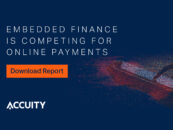
Breaking Down Marketplace Borders
by Anders la Cour, co-founder and Chief Executive Officer of Banking Circle October 16, 2020Anders la Cour, co-founder and Chief Executive Officer of Banking Circle explains how Banking Circle Marketplaces empowers global trade by helping PSPs that support marketplace merchants to access fast, affordable cross border payments.
When a new business launches, payments are typically quite low on the list of priorities. Funds and transactions will usually be managed through a familiar and trusted bank as the start-up cannot invest in researching alternative options.
However, SME banking charges can be prohibitive, especially when looking to expand internationally. Cross border payments are slow and expensive through traditional banks, as they use the correspondent banking network, with each bank in the chain charging a landing fee. Legacy systems of traditional banks cause inflexibility for their own operations, so they struggle to provide the best payment solutions for SMEs.
Online marketplaces are an increasingly popular avenue for smaller businesses and start-ups to rapidly grow their customer base. However, when a customer in another country places an order, profits and cashflow take a hit as the funds make their way from buyer to seller. Payments businesses have stepped in to bridge this gap and provide a faster, more cost-effective transactions solution, but changes introduced under PSD2 have brought an end to online marketplaces being exempt from payments regulations.
For marketplaces to remain exempt, the flow of funds must bypass the marketplace. To meet this new need and address pain points identified in our market research, we have used our innovative financial infrastructure to build a solution with the needs of the industry right at the heart: Banking Circle Marketplaces.
Inclusive, compliant, global
Banking Circle is a new fully licensed bank, free of legacy systems. We are committed to building and delivering accessible and affordable solutions to help businesses of all sizes compete and prosper. The suite of innovative Banking Circle solutions is increasing financial inclusion by providing previously excluded businesses with access to affordable and compliant payment solutions.
Banking Circle Marketplaces enables Payment Service Providers (PSPs) to accept payments from marketplace buyers into a virtual IBAN account in the name of the marketplace seller and settle the funds back to the seller’s house account in the currency of their choice, allowing them to take control of the foreign exchange conversions.
Online sellers join marketplaces to get instant access to global markets. Some marketplaces require their sellers to have local currency accounts in the country from which they are receiving funds. Addressing this issue, Banking Circle Marketplaces provides sellers with local IBANs in the country in which they want to sell – typically in GBP, EUR and USD – that are in the seller’s name.
The virtual benefit
Banking Circle Virtual IBAN is a unique solution that gives Payments businesses the ability to issue multi-currency IBAN accounts to their customers in multiple jurisdictions. They can now access a reliable and fully flexible cross border payment system. As such, merchants can make and accept payments, cross border, in different currencies, in a way that traditional banks are unable to facilitate.
Banking Circle Marketplaces was specifically designed to support Payments businesses servicing online marketplaces, and their sellers. The solution uses virtual IBAN accounts to give Payments businesses serving online marketplaces a genuine added value, without any requirement for upfront investment in systems or process changes. Accounts deliver full transparency and faster settlement, enabling Payments businesses to offer marketplaces and their sellers a full transactional service at low cost.
Improvements are experienced across payments acceptance, screening time, reconciliation/settlement times, and customer experience. Payments are made and received at low cost per transaction, delivering a valuable competitive advantage previously unavailable to smaller sellers.
Banking Circle is tackling the financial exclusion often faced by SMEs and adding value to the customer propositions for banks and payments providers.
Learn more at bankingcircle.com
Featured image credit:Technology vector created by macrovector – www.freepik.com







